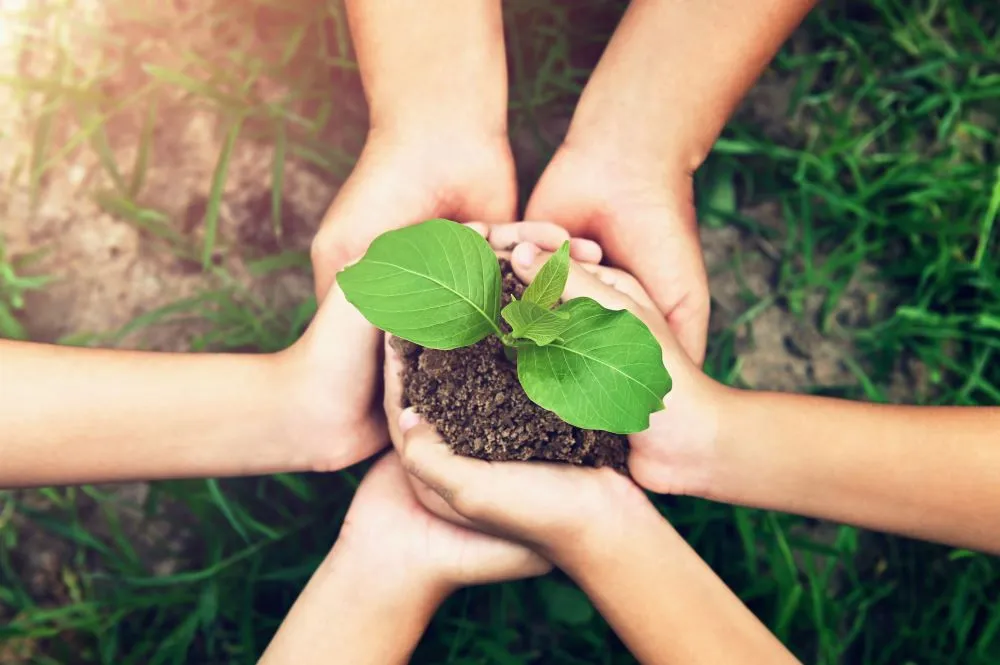You can start an environmentally friendly lifestyle with small habits at home. Not only is it beneficial for nature, this lifestyle can keep your family healthy and happy.
Consistently implementing an environmentally friendly lifestyle will have a good long-term impact, so that future generations can experience it and continue its implementation well.
So, for those who are curious about what an environmentally friendly lifestyle is and the tips for it, you can check the following review directly.
An environmentally friendly lifestyle or what is known as sustainable living is a type of lifestyle that aims to reduce negative impacts on the natural environment.
Someone who adopts this lifestyle means realizing that the availability of natural resources is increasingly limited, so it requires wise management.
Apart from that, there are several meanings of an environmentally friendly lifestyle, namely:
1.1 Trends for Many People
An environmentally friendly lifestyle can become a trend for many groups, from young people to adults. Just start by changing simple habits, then the impact will be felt in the future, you know.
1.2 Lifestyle Avoiding Activities That Damage Nature
Apart from being able to do it with small habits, this lifestyle will keep you away from various activities that damage nature. Interestingly, you will participate in preserving nature and managing natural resources wisely later.
1.3 Maintaining Sustainability for Future Generations
According to the National Waste Management Information System submitted by the Ministry of Environment and Forestry, in 2023 the amount of waste produced will reach 13,888,161 tons per year. However, only 51.93% of the waste has been handled.
Of course, this waste must be handled properly so that future generations can feel the benefits. You don't need to do anything big, just by changing small habits that damage the environment, you are already helping to preserve the environment.
1.4 Turning Small Habits into Big Impacts
An environmentally friendly lifestyle can also mean changing small habits into big impacts. Starting from avoiding littering and buying organic food products.
Apart from that, you can start walking or using public transportation instead of private vehicles, bringing your own drinking bottles, recycling rubbish and so on.

2. Why Should You Start an Environmentally Friendly Lifestyle?
Not only does it preserve nature and have a positive impact on future generations, an environmentally friendly lifestyle has a number of extraordinary benefits, namely:
2.1 Save Expenses
Implementing sustainable living will allow you to save more on expenses in the long term. Because, you will prioritize buying environmentally friendly products that are long-lasting, so you don't have to replace them repeatedly. In fact, such products are easy to recycle, so expenses can be limited.
2.2 Improving Quality of Life
By starting this lifestyle, you can improve your overall quality of life. The personal satisfaction you feel will make life more meaningful. So, not only will you contribute to protecting the environment, you will also feel happy later.
2.3 Improve Health
Sustainable living enables you to improve your health consistently. One way is by walking or cycling instead of using private transportation. Thus, body health is maintained while reducing the impact of pollution on the environment.
2.4 Reducing Negative Environmental Impacts
Even if you only take simple actions, the activities you do can reduce negative environmental impacts. Starting from reducing the use of dangerous chemicals and replacing them with environmentally friendly products to using cloth shopping bags.
2.5 Maintaining the Availability of Natural Resources
Limited natural resources (SDA) must be maintained so that they can be used for the long term. One example of maintaining the availability of natural resources is reducing water waste.
2.6 Improving the Quality of Public Health
Apart from being felt by yourself, adopting an environmentally friendly lifestyle can also improve the quality of people's health.
One of the simple activities that people can do is reducing the use of dangerous chemicals, such as pesticides on food. Apart from that, you can start walking, cycling or using public transportation to reduce air pollution which has a bad impact on your health.
3. 21 Ways to Live an Environmentally Friendly Lifestyle
If you want to start an environmentally friendly lifestyle, then you can follow the following tips.
3.1 Save Water Use
The first tip for implementing an environmentally friendly lifestyle is by using water wisely.
If there is a leaking faucet, make sure to repair it immediately or replace it with a shower that has a more efficient water output. Apart from that, you can collect rainwater for various household purposes, one of which is watering plants.
That way, you can save on water use while maintaining the sustainability of the water ecosystem.
3.2 Reduce Plastic Use
When shopping, plastic is a material that is often used to wrap the products you buy. If you continue to use them, plastic bags will accumulate and become waste that is difficult to decompose, causing pollution to the environment. It takes tens to hundreds of years for plastic-based waste to decompose.
Therefore, make it a habit to bring shopping bags that can be used repeatedly. Shopping bags in the form of tote bags and cotton net bags are suitable for storing purchases of fruit, vegetables and other household necessities.
However, if you already have a lot of plastic bags, then reuse the plastic items to use when shopping again. You can also use it as a place to store meat.
3.3 Use Recycled Packaging
Make sure you choose products with recyclable packaging. The method is quite easy, when you are shopping, check whether the product you want to buy has a recycling label or not.
By following these tips, you are taking part in recycling efforts, reducing waste and environmental pollution.
3.4 Use Energy Saving Lamps
Start replacing conventional lights with energy-saving lights, such as fluorescent or LED lights. Apart from being long-lasting, lower wattage and brightly lit, using energy lamps consumes less power and can reduce your daily carbon footprint. This action not only saves energy, but reduces electricity costs in the long term.
3.5 Select Walking or Cycling
Walking or cycling not only reduces air pollution, but can maintain your respiratory health. In fact, this activity will reduce traffic jams in urban areas, thereby creating a clean and comfortable environment.
3.6 Reduce the Use of Private Vehicles
Get into the habit of reducing the use of private vehicles and choosing to use public transportation when traveling. The aim is to reduce carbon gas emissions which have the potential to damage the ozone layer and make daily temperatures higher.
3.7 Save Electricity Consumption
If you are not using electricity, make sure you turn it off so you can save on electricity consumption. For example, turning off the lights from morning to evening, using a fan or AC only when needed, and reducing the use of gadgets.
Because excessive use of gadgets will drain the battery quickly, so you have to charge it more often. Of course, this will cause more carbon emissions to be wasted.
3.8 Use Environmentally Friendly Cleaning Products
Using environmentally friendly cleaning products could be one of the tips that you and your family can do. For example, when washing, it is best to use unscented detergent or detergent with less foam which produces lower chemical waste.
Not only that, you can also use natural ingredients as home cleaning products, such as apple cider vinegar, lemon or orange juice, baking soda and lerak seeds.
3.9 Refill Drinking Bottles
Bringing a refillable drinking bottle or tumblr is an alternative step to reduce the amount of plastic bottle waste. Bring a drinking water bottle from home when you want to go outside. Of course, this activity saves you money because you don't need to buy drinking water anymore.
3.10 Do not Burn Any Rubbish
Avoid burning rubbish carelessly because the smoke it produces contains chemicals that are dangerous for health and environmental cleanliness.
Bad impact on health, namely increasing the risk of cancer. Meanwhile, for the environment it will cause air pollution.
So, in order to reduce burning of waste, make sure to use products that can be recycled or donate them. Apart from that, you can process food waste, fruit and vegetables into organic fertilizer.
3.11 Start Planting Small Plants
You can start planting small plants to participate in preserving the environment. No need to plant in the forest, just plant trees around your yard.
The positive impact of planting plants is increasing oxygen levels, participating in reforestation and reducing air pollution.
3.12 Holding Joint Activities to Protect the Environment
The next tip for starting an environmentally friendly lifestyle is that you can take part in joint activities to protect the environment, one of which is donating. The aim is to support environmental conservation projects, such as forest preservation, reducing plastic waste, and others.
3.13 Replacing Tissue with a Handkerchief
Using disposable tissues is more practical, but will increase the amount of waste later. According to the World Wildlife Fund (WWF), around 270,000 trees are cut down every day to meet global tissue production needs. This is the main cause of deforestation and climate change.
Therefore, you should start using a handkerchief or cloth towel as a substitute for tissue. You can clean the handkerchief and reuse it later. So, you can minimize the use of tissue and reduce the impact of excessive waste.
3.14 Limit Food Waste
Limiting food waste or wasted food can also be an environmentally friendly lifestyle activity. Because excessive use of food waste will only make the waste pile up even more.
According to the United Nations Environment Program (UNEP), it is estimated that the total food waste in Indonesia is around 20.93 million tons per year. Of course, this food waste will have a bad impact and produce greenhouse gas emissions.
Therefore, you can start dividing food portions appropriately, aka only according to your needs. Then, convert the food waste into fertilizer that is useful for the soil and plants.
3.15 Separating Organic and Inorganic Waste
Make sure you regularly separate it according to type, namely organic and inorganic waste.
Organic waste consists of materials that can be used as compost, such as onion skins, vegetable scraps, rotten fruit, and others.
Meanwhile, inorganic waste is a type of waste that can be recycled, such as glass, plastic, paper and metal products. You can recycle this type of waste into useful craft products.
3.16 Reduce Paper Use
Reducing paper use in the digital era certainly isn't that difficult, right? You can write notes and read books online practically. The less paper used, it means that less paper is produced.
You probably already know that paper is made from trees. So, by reducing the use of paper, you have reduced tree cutting activities which can be detrimental to the environment.
If you still need paper, it's best to use recycled paper. Because, this type of paper is easy to reuse as new paper later.
3.17 Using Renewable Energy
According to Green Match, energy savings can also be done by installing PV, aka solar photovoltaics. This tool can convert solar energy into electricity to get a reliable source of sustainable energy.
3.18 Reduce Consumption of Meat and Dairy Products
Is it true that reducing meat consumption is an environmentally friendly lifestyle?
It's true, meat and dairy products can produce quite large greenhouse gas emissions in the agricultural industry. These gas emissions are produced during the production process of preparing meat and milk.
In fact, the UN states that the livestock sector contributes around 9% of CO2 and produces greater greenhouse gases, namely 65% of nitric oxide levels which can increase CO2. As a result, the potential for global warming increases by 296 times.
Therefore, you can start reducing your consumption of meat and dairy products so you can contribute to reducing greenhouse gas emissions. Don't worry, you don't need to be 100% vegetarian or vegan, OK? Just reduce consumption to 2-3 times a week while increasing consumption of fruits, vegetables and whole grains.
3.19 Implement the 3R System
The 3R system means Reuse (reuse), Reduce (reduce use), and Recycle (recycle). The 3R system is effective in reducing the amount of waste in the surrounding environment.
3.20 Consider Using an Electric Vehicle
Another alternative to using public transportation as an effort to reduce vehicle emissions, is by using electric vehicles. Electric vehicles, whether motorbikes or cars, are a means of transportation that can be said to be quite environmentally friendly. This is because electric vehicles do not need petrol or oil to start them. So, you can save more energy because you limit the use of petroleum.
Not only that, electric vehicles produce less gas emissions and pollution than vehicles in general. That way, environmental pollution due to air pollution will be reduced.
3.21 Urban Farming
If you live in an urban area, you can start doing urban farming, aka farming on urban land. By doing urban farming, you don't need to buy vegetables or fruit at the market anymore. Thus, it can reduce the carbon footprint while helping to increase oxygen levels in the city.
Urban farming is usually carried out in the yard, balcony or roof of the house. This activity not only has a positive impact on the environment, but makes you save more and doesn't need to spend time leaving the house to walk to the supermarket or market.
That's information about tips for implementing an environmentally friendly lifestyle that you and your family can do. How, it's not difficult, right? You can start with the simple steps as explained above. Even though it is small, the changes you make will have a big impact on the environment. So, come on, start implementing it and feel the benefits!
BFI Finance is a financing company that provides financing with motor vehicle guarantees and house certificates. Apply for your financing for various needs such as additional business capital, house renovations, education, and so on. #AlwaysThere is a Way with BFI Finance!







